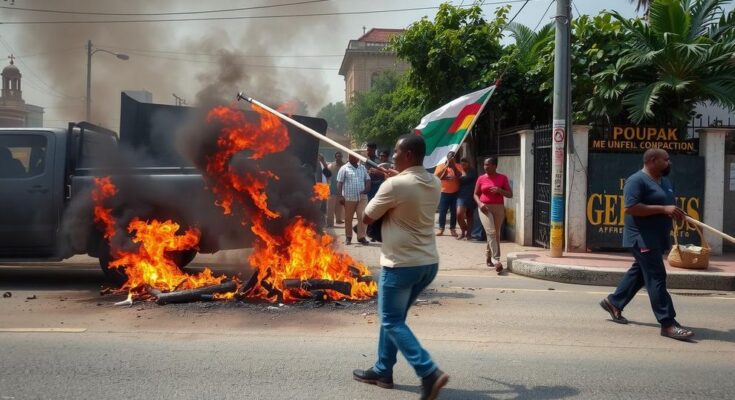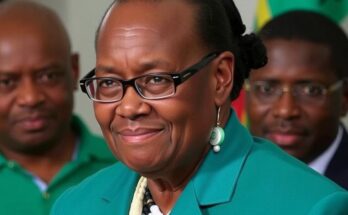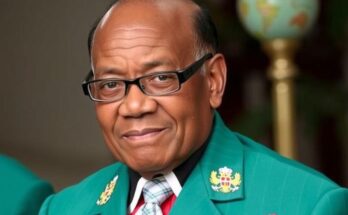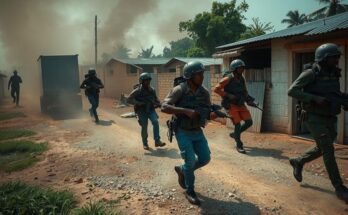In Mozambique, unrest following the ruling Frelimo party’s election victory has led to at least 21 deaths, including two police officers. The confirmation of the election results sparked extensive violence, with 236 serious incidents reported across the nation. Interior Minister Pascoal Ronda stated that armed groups attacked police and public facilities, while opposition leader Venancio Mondlane claimed the election was rigged, urging further protests to demand electoral truth and accountability.
At least 21 individuals, including two police officers, have lost their lives in Mozambique amidst violence ignited by unrest following the ruling Frelimo party’s declared victory in the presidential election. The confirmation by the nation’s highest court occurred on December 24, 2024, and has resulted in widespread chaos, with reports indicating over 236 incidents of significant violence, 25 injuries, and the arrest of more than 70 individuals affiliated with these violent outbreaks.
Renowned for being stable since its independence in 1975, Mozambique is grappling with unprecedented civil unrest following the October 9 election. Interior Minister Pascoal Ronda highlighted that armed groups armed with bladed weapons and firearms are attacking police stations and public infrastructures. The capital, Maputo, has witnessed skirmishes as law enforcement responded with armored vehicles to control protests that erupted in multiple cities and left several establishments vandalized or destroyed.
The situation has significantly deteriorated, with Maputo Central Hospital operating in emergency conditions due to injuries sustained in the protests. Main roads leading to the capital remain obstructed by barricades, and public transport has come to a halt, leaving citizens unable to access basic necessities. The unrest has extended to the northern provinces, where opposition support is robust, suggesting a rise in tensions. The former opposition leader, Venancio Mondlane, has vocally opposed the election results, alleging electoral fraud and calling for a “People’s Constitutional Court.”
Daniel Chapo, the Frelimo presidential candidate, confirmed victory with 65.17 percent of the vote, although this figure reflects a decrease from earlier reports. In the National Assembly, Frelimo retains a majority but has lost seats compared to prior elections. Chapo, set to take office in mid-January, offered a conciliatory message during his victory speech, emphasizing the need for dialogue with all parties involved.
The recent unrest in Mozambique follows the presidential election results confirming the ruling Frelimo party’s victory, intensifying long-standing political tensions in the country. The Frelimo party has been in power since 1975, and this latest round of violence reflects deep-seated grievances over electoral legitimacy, particularly from opposition supporters who claim electoral fraud. The confirmation of election results by the highest court has exacerbated the violent protests, leading to significant casualties and widespread unrest across urban and rural areas. With a history of violence stemming from political disputes, the situation in Mozambique has escalated following the controversial election, revealing the fragile nature of democracy in the region and the potential for further conflicts. The dynamics between the ruling party and opposition groups illustrate a continuing struggle for political legitimacy and representation.
In conclusion, the post-election violence in Mozambique has resulted in significant loss of life and an alarming increase in instability. With the ruling Frelimo party confirmed as victorious amidst claims of electoral fraud, the situation reflects deeper political rifts within the country. As both the government and opposition stakeholders navigate this tumultuous period, the potential for future violence remains a serious concern, highlighting the urgent need for dialogue and reconciliation. The political climate in Mozambique serves as a reminder of the complexities involved in sustaining democratic governance, particularly in the context of heightened tensions and unresolved grievances among the populace.
Original Source: www.geo.tv




